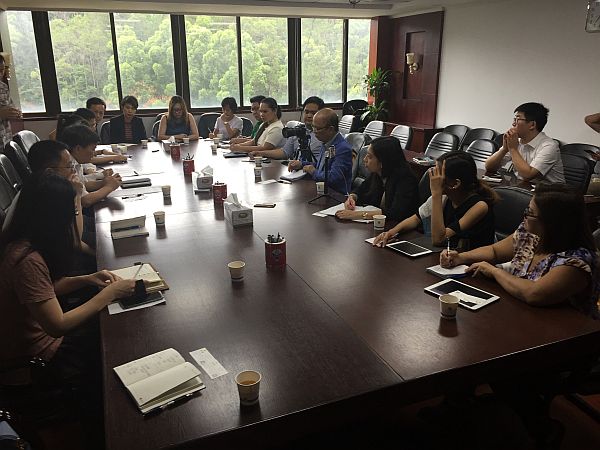Henry Sy’s hometown eyes PH’s textile, agri industries

Filipino journalists interview officials of the Xiamen Municipal Bureau of Commerce.
FUJIAN INVESTORS
Fuzhou, China — The home province of well-known Filipino-Chinese entrepreneurs announced over the weekend the interest of Chinese companies to invest in the Philippines in the fields of textile, mining and agriculture.
Li Lin, deputy director general of Fujian Provincial Foreign Affairs Office, said the province shares close relations with the Philippines because Fujian is the hometown of most overseas Chinese including some 1.68 million living in the Philippines.
“There is frequent people-to-people exchanges between Xiamen and the Philippines because of the existence of close relations between the two countries,” Li told visiting Filipino journalist last Saturday.
Li said nearly 70 percent of Chinese enterprises in Fujian are privately owned. These companies visit the Philippines and establish partnerships with Philippine-based companies.
Match
Melanie Ng, president of Cebu Chamber of Commerce and Industry (CCCI), said they met a delegation from Xiamen when they visited Cebu last March 2017 during the Fujian Week.
During the trade matching, Ng met entrepreneurs from Jinjiang, another city in Fujian province known for its manufacturing companies which produce footwear, clothes, sports gears and suitcases.
She expressed optimism on increased economic cooperation between China and the Philippines as long as trade talks and business-to-business interaction continues.
“We are eager to continue our engagement with the entrepreneurs from Jinjiang especially as there are more direct flights to Cebu. There’s more inclination to connect and collaborate especially as we share strong ties with Fujian province,” said Ng, who traces her roots to Jinjiang.
Fuzhou, Xiamen and Jinjiang belong to the Fujian province.
Xiamen has a sister-city agreement with Cebu City that was signed on October 26, 1984.
The provinces of Cebu and Fujian are expected to sign a sister-province agreement within the year to strengthen economic relations and boost bilateral relations between the two provinces.
Projects
Zheng Shunlin, director of the foreign trade division of Xiamen Municipal Bureau of Commerce, said there are over 210 Philippine-owned enterprises with actual investments of $280 billion in Xiamen.
Zheng said Xiamen exports textile, footwear, steel and porcelain to the Philippines.
It imports nickel, iron ore, automatic data processing equipment, and dried and fresh fruits (mangoes, pineapples, banana) from the Philippines.
In Fuzhou’s neighboring city of Xiamen (formerly known as Amoy), Lucio Tan’s Eton Properties Group owns several upscale real estate development projects. Tan’s business empire also extends to Shanghai, Beijing, Dalian, Shenzhen and Zibo, among other locations in mainland China.
Henry Sy’s company, SM Prime Holdings Inc., opened the first SM mall in Xiamen in 2001. Since then six malls were opened in Jinjiang, Chengdu, Suzhou, Chongqing, Zibo and Tianjin.
Robinsons Land Corporation (RLC) operates Robinson’s Galleria in Xiamen. RLC is a company under JG Summit Holdings, Inc. where John Gokongwei Jr. sits as founder and chairman emeritus.
Tan, Sy and Gokongwei trace their ancestry to Fujian province.
Disclaimer: The comments uploaded on this site do not necessarily represent or reflect the views of management and owner of Cebudailynews. We reserve the right to exclude comments that we deem to be inconsistent with our editorial standards.
